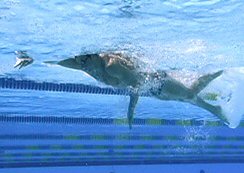2/8/05 Eyes Down on Flip Turn
Text and Photo/Video by Glenn Mills
Demonstrated by Scott Tucker
Premium
Members - Click Here to Download Bonus Video Clip (Windows Media Player Format
2.0MB)
Premium
Members - Click Here to Download Bonus Video Clip (Quick Time Format 2.0MB)
If you want a GREAT flip turn, you need to pay attention not just to the FLIP
but also to how you SET UP for the flip. In other words, how you APPROACH the
wall is just as important as how you do your somersault. Many swimmers like to
add extra steps and motions to the approach. Some of them hunch up their
shoulders, thinking that rising UP will help them drive their bodies DOWN into
the turn. Others do a double take, glancing up to make sure the wall is still
there. Both of these motions, as small as they may seem, cause the body to
rise…and the hips to fall. They interrupt your momentum, and send it in the
WRONG direction.
Swimmers understand the importance of head position when they streamline on the
pushoff, but sometimes forget how key it is to maintain that position for the
rest of the race. By learning how to use the lines on the bottom of the pool,
rather than looking at the cross at the end, you’ll end up with a faster,
tighter turn. You’ll carry all of your momentum into the wall, and will have
more momentum for the pushoff. Increased wall speed will help you start
swimming with more speed – always a good thing to do in a race!


|
Step #1. Keeping your eyes down when you turn
starts with learning to keep your eyes down when you FINISH. Start by simply
practicing finishes without looking at the wall. Get your bearings by looking
for the cross -- or “T” -- on the bottom of the pool, and learn how far it is
from the T to the wall. If you need to look at something, look at the spot
where the wall meets the floor of the pool, but fight the instinct to look
directly at the wall in front of you.
|


|
Step #2. After you feel comfortable that you
know when you’re going to hit the wall with your hand, move on to your flip
turn. Again, start slowly if you’ve never done this, and keep your heels close
to your bottom. Stay in a very tight tuck, which will help you to spin faster.
As in Step #1, fight the instinct to look forward. Keep your head in the same
position it’s in when you swim. When it’s time to turn, don’t lift up with your
shoul-ders, neck, or head. Instead, let your head FOLLOW your hand on your last
stroke in, down, and around.
|
In the video, you’ll notice how Scott Tucker, two-time Olympian and Gold
Medalist on the 400 Free Relay in 1996, keeps his eyes down, and looks at the
bottom as he ap-proaches the wall. He’s practiced this so much that he needs
very few visual cues to let him know where the wall is. In the video, he’s
turning on a bulkhead, so he has no vis-ual cue for where the wall meets the
bottom.
This kind of fluency and continuous forward motion comes with MUCH practice,
but will allow you to not only win on the walls, but also to improve your time.
Remember, don’t add steps or extra motions to your turn, and keep your head in
the position you know is best for swimming fast...even on the walls.